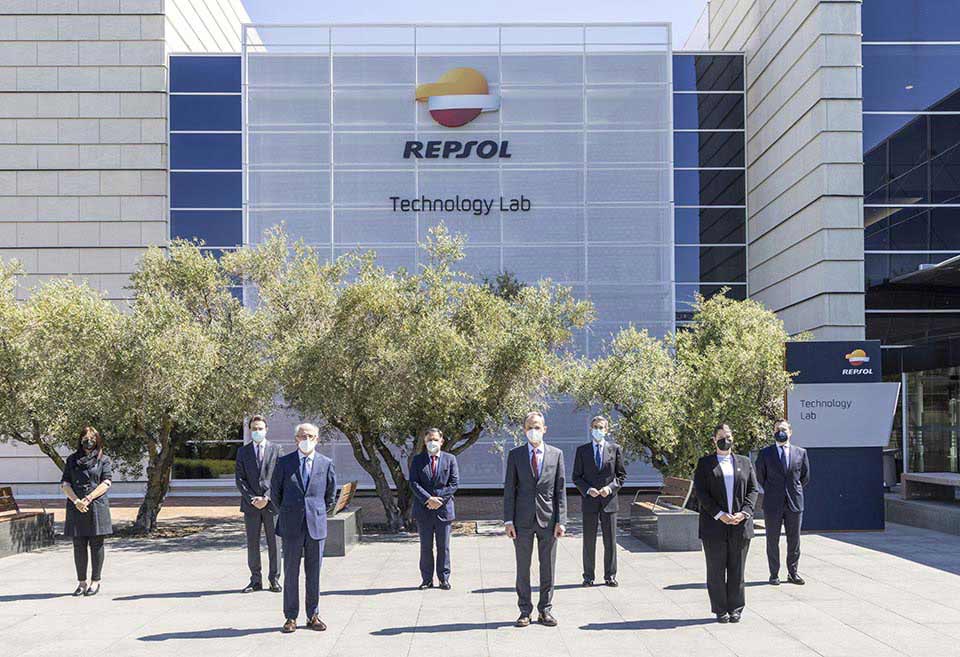
Pedro Duque shows interest in Repsol's technological innovation to advance the energy transition
- Repsol Chairman Antonio Brufau, Executive Director of Energy Transition, Sustainability, and Technology Luis Cabra, and Executive Director of Communication, Institutional Relations, and the Chairman’s Office Arturo Gonzalo today accompanied the Spanish Minister of Science and Innovation, Pedro Duque, during his visit to the Repsol Technology Lab research center in Mostoles outside Madrid.
- Pedro Duque was particularly interested in the strategic lines that Repsol is developing in terms of digitalization and the application of artificial intelligence in industry, as well as cir-cular economy initiatives and renewable hydrogen that will help the company transform its businesses and advance in the energy transition to achieve the goal of zero net emissions by 2050.

The Spanish Minister of Science and Innovation, Pedro Duque, today visited the Repsol Technology Lab research center that the multi-energy company owns in the city of Mostoles just outside Madrid. He was accompanied by the company's Chairman, Antonio Brufau, the Executive Director of Energy Transition, Sustainability, and Technology, Luis Cabra, and the Executive Director of Communication, Institutional, and the Chairman’s Office, Arturo Gonzalo. During the visit, Duque learned about the strategic lines that Repsol is developing to transform its businesses, with the aim of advancing in the energy transition and achieving the goal of zero net emissions by 2050.
The visit was also attended by Noelia Posse, the mayoress of Mostoles, Rebeca Prieto, city councilor for Employment and New Technologies, Javier Ponce, General Director of the Center for Industrial Techno-logical Development, and Jaime Martin, Corporate Director of Technology and Corporate Venturing at Repsol. The researchers leading the projects explained firsthand to the Minister the technological developments they are working on in digitization and the application of artificial intelligence, circular economy, and renewable hydrogen.
With the ambition to lead the energy transition, Repsol is committed to technological neutrality. For this reason, the company is developing a wide range of technologies that provide solutions to climate change, with the firm conviction that all of them will be necessary to meet the enormous challenge of decarboni-zation of our societies. It is important that the regulatory framework allows them to compete with each other freely and on equal terms so that society can finally opt for those that are more cost-efficient
Digitalization and technology are fundamental tools for Repsol in the energy transition. Together with en-ergy efficiency, the circular economy, renewable hydrogen, and the capture and use of CO2 are the key levers on which the company bases its strategy to transform all its industrial centers into multi-energy hubs, capable of generating products with a low, zero, or even a negative carbon footprint, as reflected in its Strategic Plan 2021-2025..
To achieve its targets, Repsol will increase renewable generation to 7.5 GW in 2025 and double this figure to 15 GW in 2030; produce 1.3 million tons of sustainable biofuels in 2025 and more than 2 million tons in 2030; and produce renewable hydrogen, with a capacity of 400 MWeq in 2025 and the ambition of reaching 1.2 GWeq in 2030, thereby leading this market in the Iberian Peninsula.
Commitment to cutting-edge research
The Repsol Technology Lab is a leading research center with more than 240 scientists and researchers. The main lines of research currently being addressed are related to the decarbonization of the industry, renewable hydrogen throughout the value chain; generation, storage, management and efficient use of energy; the development of new sustainable fuel compositions and advanced materials; and the creation of mathematical methods and advanced simulation to improve efficiency in operations.
To achieve this, year after year Repsol maintains its investment in research, development, and innovation projects with an expenditure of €380 million over the last five years - 70 of these in 2020 alone, a year marked by the difficult context of the pandemic.
Additionally, the development of these technologies is carried out within the framework of an open inno-vation model, through partnerships with other research centers, universities, and companies. In this mod-el, the entrepreneurial ecosystem has a very important weight, thanks to the Repsol Corporate Venturing investment fund, endowed with €85 million to boost the growth of startups that offer solutions in the areas of decarbonization, circular economy, advanced mobility, digital technologies, and asset optimization.
As a result of this innovative approach, Repsol is continuously to be found in the top tier in the ranking of Spanish companies with the highest number of patent applications. In 2020, it was, thus, the first in the energy sector with 11 new patent families filed.
